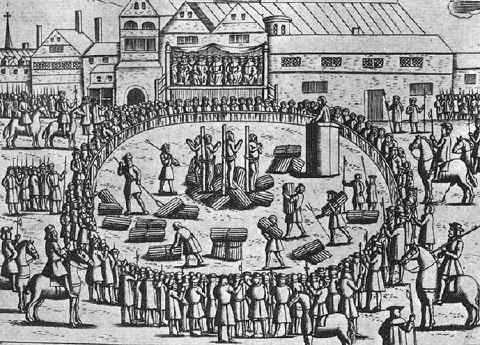Anne Askew
It wasn't only Henry VIII who had problems getting a divorce. Anne Askew, part of a landed Lincolnshire family, was forced by her father, Sir William Askew, to take her dead sister's place in an arranged marriage with Thomas Kyme. This marriage was deeply unhappy, and Askew was eventually turned out of her husband's household because of her strong Protestant convictions. Askew left behind her husband's name and their two children and traveled to London where she unsuccessfully sought a divorce on scriptural grounds (1 Corinthians: 7.15) claiming that her marriage was invalid because he was an unbeliever.
After her failed attempt to divorce, Askew sought support from her friends at court, such as Katherine Parr. Despite Henry VIII's break with Rome, much of England still adhered to Catholic ideology, and reformers -- especially female reformers such as Askew -- were often perceived as serious threats to the religious status quo. Although Parr was initially able to obtain a pardon for her friend, she was for a second time tried on charges of heresy in June 1545. This time she could not escape the clerics and government ministers who wished to quell her doctrinal dissent, and she was tortured on the rack in the Tower of London in an attempt to have her implicate Katherine Parr. Askew, however, went to her death, too crippled to stand after months of torture, without incriminating her friend.
Her Writings
Anne Askew's Examinations defies the constraints of gender and hierarchy, and attempts to expose patriarchal insecurity surrounding female involvement in traditionally male religious subjects:
They said to me there that I was a heretic, and condemned by the law if I would stand in my opinion. I answered that I was no heretic, neither yet deserved I any death by the law of God. But as concerning the faith which I uttered and wrote to the council, I would not, I said, deny it, because I knew it true. Then they would needs know if I would deny the sacrament to be Christ's body and blood. I said, "Yea, for the same son of God that was born of the Virgin Mary, is now glorious in heaven, and will come again from thence at the latter day, like as he went up (Acts 1). And as for that ye call your God, is but a piece of bread. For a more proof of thereof (mark it when ye list) yet it lie in the box but three months, and it will be mould and so turn to nothing that is good. Whereupon I am persuaded that it cannot be good."
